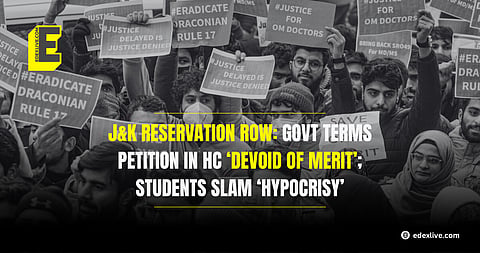

The Jammu & Kashmir government has filed an affidavit before the High Court of Jammu and Kashmir, Srinagar division, defending its reservation policy and rejecting the challenge mounted by a group of petitioners, including Open Merit category students.
In the response submitted to the high court yesterday, on April 4, the government stated that the pleas were “devoid of any merit” and sought their dismissal.
The case, which challenges the constitutionality of certain provisions of the Jammu and Kashmir Reservation Rules, has now been listed for hearing before the Supreme Court on April 15, 2025.
“Attempt to abuse judicial process”
In its affidavit, the J&K government has stated that the reservations extended to Socially and Educationally Backward Classes (SEBCs), Pahari-speaking people, and other reserved categories are “constitutionally valid and rooted in the principles of social justice.”
The affidavit also criticises the petitioners’ interpretation of equality, arguing that “equality does not mean treating unequals equally”, and insists that affirmative action is a “constitutionally recognised tool for the upliftment of underrepresented communities.”
Further, the affidavit submitted by the Jammu & Kashmir Social Welfare Department claims that the petition has been filed on false grounds and in an attempt to deceive the high court.
“As such, the instant writ petition on the face of it is an attempt to abuse the judicial process motivated by ill, ulterior and oblique motives,” the document says.
It further noted that several claims made in the petitions are “based on erroneous assumptions and misconceived readings of the Reservation Rules.”
The affidavit concludes by urging the Court to dismiss the pleas.
“Double standards”: Students hit back
Soon after the affidavit was filed, the Open Merit Students Association (OMSA) criticised the government for what they described as a blatant case of “hypocrisy.”
“Earlier, the government used to give this excuse that the issue is subjudice — that the court will eventually decide. But today, after the government submitted its affidavit in response to the case, they took a stand in favour of the reservation policy. They essentially denied the judicial validity of the case,” said Mir Mujeeb.
Mujeeb added that the government’s response has exposed its “double standards”.
“Until now, resolutions passed by Open Merit students were being ignored or denied on the grounds that the case is pending in court. But suddenly, they say the petition is baseless. This is clear hypocrisy, a double standard,” he said.
“J&K government is committed”
Meanwhile, in a press conference following the affidavit’s submission, Social Welfare Minister Sakina Itoo addressed questions about the controversy.
She confirmed that the matter had been legally responded to and that a subcommittee has been constituted to examine the broader concerns raised by different student groups.
“The affidavit they are talking about has been presented in a roundabout way. But I would like to say that the government is committed. Within six months, the government will submit its reservation report. And the government will implement this report. That is the commitment of the government. And the government will fulfill this commitment,” she said.
Background
The case before the High Court challenges specific provisions of the Jammu and Kashmir Reservation Rules.
Petitioners have argued that these changes disproportionately affect Open Merit candidates, effectively reducing their chances in competitive recruitment and admissions.
The petition also raises concerns about reservation in promotions, which they argue goes against established Supreme Court precedents, including the need for quantifiable data to justify such measures.
The reservation policy in Jammu and Kashmir has sparked widespread uproar in recent months, especially among Open Merit students who allege systemic exclusion and unequal treatment.
These concerns have led to student-led protests, legal challenges, and strong public scrutiny.
